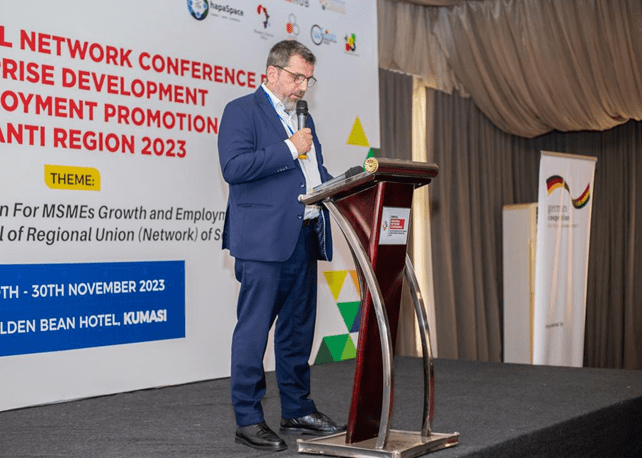The European Union, together with the German Agency for International Cooperation (GIZ), has held a Regional Network Conference as part of efforts to create a forum for knowledge-sharing and bridge the gap between the supply and demand side of micro, small and medium-sized enterprises (MSMEs).
The two-day annual conference was held as part of GIZ’s Private and Financial Sector Programme (PFS). It focuses on employment promotion and enhancing business skills by leveraging lessons and expertise from previous projects to support the private sector.
The event was on the theme ‘Sustainable Solutions for MSMEs Growth and Employment: The Transformational Potential of Regional Union (Network) of Service Providers.

MSMEs make up a large portion of the country’s economy and account for over two-thirds of employment. However, some of them lack certain basic essentials such as proper human resources since most of them do not have technical HR persons on board, inadequate financing, among other things.
For these reasons, the GIZ’s Support to the Private and Financial Sector (PFS) Programme has set itself this aim to improve the employment situation of MSMEs in various regions of the country with the annual network conference that will catalyse the enormous potential of micro, small and medium-sized enterprises (MSMEs) and, thus, contribute to achieving the aim of this aim.
The event engaged experts, financial and insurance providers, industry associations, government representatives, academic institutions, trade unions and digital and tech players.
Head of PFS Programme at GIZ, Dr. Christian Jahn, giving a keynote address at the first day of the two-day conference in Kumasi, said the key to unlocking the full potential of MSMEs lies in collaboration; therefore, a regional association of service providers dedicated to supporting MSMEs is the way to go.
“Networks have proven to be catalysts for modern development and provide valuable opportunities for collaboration and knowledge-sharing. The interactive conference will include expert-led discussions, breakout sessions, panel discussions and a marketplace for businesses. This hybrid event also welcomes remote participation of international experts, enhancing its global relevance,” he said.
The second day of the conference saw participants – job seekers, service providers and MSMEs – resolve to form a regional union (network) of MSME and employment promotion service providers in the Ashanti Region.
The Regional Coordinating Council (RCC), through a representative of the Regional Minister, Beatrice Kwarteng Osei-Asare, pledged the support of the RCC to the proposed union and recommended a private sector-led approach.










